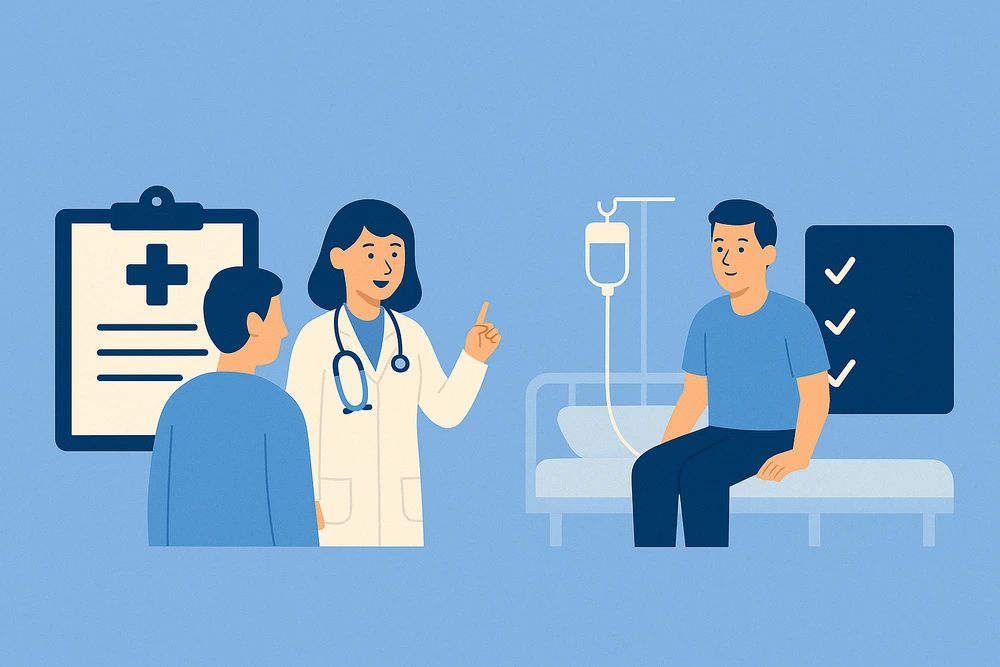Table of Contents
With rising healthcare costs in India, medical treatment has become a significant financial burden. Out-of-pocket expenses account for 48% of India’s healthcare spending, making it one of the highest in the world. This alarming figure highlights the critical need for insurance policies that cover not only hospitalisation but also the associated medical costs before and after admission.
While many individuals and businesses invest in health insurance coverage for hospitalisation, they often overlook the pre and post-hospitalisation expenses, which can be substantial and sometimes equal to or more than in-patient costs themselves.. While many individuals and businesses invest in health insurance coverage for hospitalisation, they often overlook the pre and post-hospitalisation expenses, which can be substantial.
What Are Pre-Hospitalisation Expenses?
Pre-hospitalisation expenses refer to all medical costs incurred before admission to the hospital for treatment. These are expenses related to identifying the illness and preparing for hospitalisation.
These typically include:
-
Doctor consultations and diagnostic visits
-
Medical investigations (blood tests, urine tests, X-rays, MRI, CT scans)
-
Prescription medicines
-
Diagnostic reports and specialist consultations
-
Pre-surgery evaluation and routine checkups
-
Cost of prescribed treatments before admission
-
Ambulance charges (if mentioned under pre-hospitalisation coverage)
Coverage Duration: Typically, insurers cover 30 to 60 days of pre-hospitalisation expenses before admission.
What Are Post-Hospitalisation Expenses?
Post-hospitalisation expenses are the medical costs you bear after discharge, ensuring proper recovery and treatment continuity.
These may include:
-
Follow-up consultations with doctors
-
Diagnostic tests for recovery monitoring (blood tests, X-rays, scans)
-
Medicines prescribed post-discharge
-
Physiotherapy sessions (if recommended by the doctor)
-
Post-surgical care, wound dressing, and nursing charges
-
Rehabilitation therapies related to recovery
-
Medical equipment used at home (if prescribed, like walkers, support devices)
Coverage Duration: Most insurers cover 60 to 90 days of post-hospitalisation expenses after discharge.
Why Pre and Post-Hospitalisation Expenses Are Often Overlooked
- Focus on Hospitalisation Only: Policyholders often associate insurance with hospital admission costs alone, disregarding the broader coverage benefits.
- Lack of Policy Awareness: Many insured individuals are unaware that their policy covers expenses incurred before and after hospitalisation.
- Complex Policy Wording: Technical language in policy documents makes it difficult to understand what is covered under pre and post-hospitalisation.
- Insufficient Guidance from Providers: Insurers or agents may not explicitly explain these benefits unless the customer specifically asks.
- Delayed Realisation: Policyholders often recognise these overlooked expenses only after experiencing a medical emergency, by which time it may be too late to optimise their benefits.
Quick read: What is Domiciliary Hospitalisation?
Pre-Hospitalisation Expenses Covered Under Health Insurance
- Diagnostic Investigations: Includes X-rays, ECGs, MRIs, blood work, and scans leading up to a confirmed diagnosis.
- Consultations with Specialists: Fees paid to specialists or consultants prior to hospitalisation.
- Medications: Prescription drugs required to stabilise or prepare the patient before admission.
- Pre-surgical Evaluations: Costs related to fitness-for-surgery tests or clearance processes.
- Coverage Duration: Typically, health insurance policies cover these expenses for 30 to 60 days before the date of hospitalisation.
Commonly Missed Points:
- Expenses are covered only if they directly relate to the hospitalisation condition.
- Prescriptions and diagnostic reports are mandatory to validate the claim.
- Costs of second opinions are rarely covered unless explicitly mentioned.
Post-Hospitalisation Expenses Covered Under Health Insurance
- Follow-up Consultations: Costs incurred during regular post-discharge visits to doctors or specialists.
- Medical Tests: Blood tests, imaging, and monitoring investigations ordered post-surgery or treatment.
- Therapeutic Procedures: Physiotherapy, wound care, and rehabilitation services.
- Medications for Recovery: Ongoing drug prescriptions are essential for healing.
- Coverage Duration: These expenses are generally covered for 60 to 90 days after discharge.
Commonly Missed Points:
- Policies may require proof that follow-up is related to the initial illness.
- Not all medicines or procedures (e.g., dietary supplements or elective follow-ups) are reimbursable.
- Reimbursement is subject to timelines and documentation compliance.
Common Exclusions
- Experimental or Investigative Treatments: Not recognised by mainstream medicine.
- Non-prescribed OTC Medications: Generic pain relievers, vitamins, or supplements.
- Alternative Therapies: Ayurveda, Homeopathy, unless the policy explicitly includes them.
- Non-medical Expenses: Registration charges, service fees, and administrative costs.
- Unlisted follow-up treatments, such as psychological counseling or dietary consultations, are rarely covered.
- Any treatment not pre-approved by the insurer, even if clinically relevant, may be rejected.
- The use of non-network diagnostic labs may disqualify certain reimbursements.
Suggested read: The Room Rent and ICU Limits in Health Insurance
Pre and Post-Hospitalisation Expenses in Group Health Insurance
For Employers
- Enhanced Employee Retention: Offering comprehensive coverage signals that the company values employee well-being, improving loyalty and retention.
- Lower Absenteeism: Quicker and better recovery due to post-hospitalisation care helps employees return to work sooner.
- Reduced Administrative Burden: Simplify claim and wellness management, saving HR time and effort.
- Improved Talent Acquisition: Quality health coverage makes companies more attractive to prospective talent in a competitive hiring market.
- Financial Protection for the Business: Helps avoid unforeseen payouts for employee medical emergencies that may not be fully covered otherwise.
- Tax Benefits: Premiums paid for group health insurance are eligible for tax deductions under the Indian Income Tax Act.
- Positive Work Culture: Demonstrating care for employees’ health builds trust and enhances the company’s image and internal morale.
- Compliance with Labour Welfare Norms: Offers a proactive approach to meet health-related statutory requirements.
For Employees
- Reduced Out-of-pocket Medical Expenses: Covers consultations, tests, and medications before and after hospitalisation that are often otherwise missed.
- Smoother Recovery Process: Ensures access to post-treatment follow-ups, physiotherapy, and prescriptions that aid healing.
- Access to Preventive Health Check-ups: Early detection of health issues through regular monitoring and diagnostics.
- Better Mental Health Assurance: Knowing that even follow-up expenses are covered reduces stress during health crises.
- Continued Treatment Support: Enables continuation of prescribed treatment without interruption due to financial constraints.
- More Control Over Health Decisions: Employees can choose the right treatment options without cost-based compromises.
- Family Benefits: Many plans extend to dependents, providing peace of mind beyond the employee alone.
- No Delay in Post-care: Eliminates procrastination in seeking follow-up care due to costs, leading to better health outcomes.
Also read: What is Hospital Cash Insurance?
How to Choose a Health Insurance Plan with Pre and Post-Hospitalisation Coverage
- Coverage Duration: Check if the policy offers at least 30 days of pre-hospitalisation and 60-90 days of post-hospitalisation coverage. Anything less may leave out critical follow-ups or tests.
- Range of Expenses Included: Ensure that the policy covers doctor visits, diagnostic scans, medicines, physiotherapy, and pre-surgical evaluations, not just hospital room charges.
- Transparency in Claim Settlement Process: Policies with digital claim filing options and responsive customer service can significantly reduce claim-related hassles.
- Network Hospital Coverage: A wide network ensures cashless treatment and easier access to reputed hospitals in your vicinity.
- Wellness & OPD Benefits: Some plans offer preventive check-ups, mental health consultations, and OPD support value-adds that are often overlooked but impactful.
- Pre-authorisation Process: Policies that allow faster or instant pre-approvals improve your ability to access treatment in emergencies.
- Sub-limit and Co-pay Clauses: Often buried in fine print, these can reduce claim payout significantly; ensure clarity on such terms.
- Digital Tools: Insurers offering apps or dashboards provide better claim tracking and coverage understanding.
Recommended read: Day Care Treatment and Procedures in Health Insurance
Things to Consider for SMEs and SMBs
- Cost vs. Coverage: Don’t just look at premiums, compare plans for their actual benefits, coverage caps, and inclusions.
- Customisation Flexibility: Opt for policies that allow tailoring based on employee demographics, such as family coverage or maternity benefits.
- Scalability for Growing Teams: Choose plans that can be easily scaled as your workforce expands.
- Add-on Benefits: Onsurity, for instance, offers teleconsultation, pharmacy benefits, and wellness programs that add real value.
- Employee Feedback: Survey employees to understand their healthcare needs before finalising a group policy.
- Portability and Transfer Options: Make sure the policy is easy to transfer or port, especially if your business has a high attrition rate.
Red Flags to Avoid
- Restrictive Clauses: Policies that demand excessive documentation, have limited network hospitals, or fixed timelines for pre and post-hospitalisation.
- Low Reimbursement Limits: Sub-limits on treatments, room rent, or consultations can significantly reduce claim amounts.
- Non-transparent Exclusions: Vague clauses or hidden exclusions that might reject claims without clear justification.
- Cumbersome Claims Process: Long turnaround times or a lack of a digital claims interface can cause delays and frustration.
- Lack of End-to-end Support: If the insurer or TPA does not provide clarity, handholding, or account management, especially for SMEs, it can lead to poor claim experience.
Pre and Post Hospitalisation Expenses Claim Process
- Collect Necessary Documents: Include original hospital bills, prescriptions, discharge summary, diagnostic reports, and pharmacy invoices. Many claims are delayed due to missing small but essential slips like receipts for tests or medicines.
- Submit Claims Within Timelines: Most insurers allow 7–30 days post-discharge to file claims. Submitting late, even by a day can result in outright rejection.
- Attach Proof of Continuity: For post-hospitalisation expenses, it’s crucial to show that these are directly related to the original ailment or procedure. Include referral notes and treatment continuity documents.
- Use Digital Portals When Possible: Many insurers, including Onsurity, have mobile apps or websites for uploading claims directly. This speeds up processing.
- Track Acknowledgement of Submission: Always ask for confirmation or tracking numbers after submitting the documents, whether physically or online.
- Maintain a Communication Log: Keep a record of all conversations with the insurer or TPA, email trails, dates of phone calls, and names of representatives.
Also read – Documents Required for Health Insurance Claim
Tips for a Hassle-Free Experience
- Understand Your Policy in Advance: Knowing which documents are needed, what’s covered, and exclusions before admission makes post-claim easier.
- Keep Copies of Every Document: Even after submission, retain photocopies or digital scans of all paperwork to tackle any query raised by the insurer.
- Clarify Pre-authorisation Details: For cashless claims, understand what part of the treatment is covered and get approvals beforehand.
- Don’t Mix Bills: Keep separate folders for pre-hospitalisation, in-hospital, and post-hospitalisation bills. Mixed paperwork often causes confusion and delays.
- Designate a Point of Contact: In family or team coverage scenarios, assign someone to handle documentation in case the patient is unable to.
- Use Your Insurer’s Helpdesk: Contact your insurer’s customer support for doubts. It’s better to ask up front than face rejection later.
- Stay Within Network Hospitals: Non-network hospitals can complicate cashless and even reimbursement claims due to a lack of direct communication with insurers.
Recommended read: Public and Private Healthcare in India
Conclusion
Pre- and post-hospitalisation expenses are a vital yet often overlooked part of healthcare costs. While most people associate health insurance with hospital bills, significant expenses also occur before admission – such as diagnostic tests, consultations, and medicines – and after discharge, including follow-up visits, therapies, and recovery treatments. Covering these ensures financial protection for the complete treatment journey, not just the hospital stay.
It is important to review your policy carefully, understand the coverage duration (like 30 days before and 60 days after hospitalisation), and be aware of exclusions to avoid unexpected out-of-pocket costs. By ensuring comprehensive coverage, you can focus on recovery without worrying about additional medical expenses.







